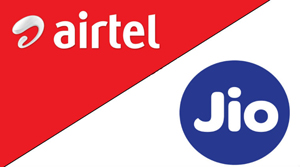Mar 21: Reliance Jio has filed a complaint with Advertising Standards Council of India against (ASCI) Airtel"s claims it is "Officially the fastest" network in India. Jio has said the claim of Airtel that it is India"s fastest network is “false, misleading and incorrect”. According to the company, the methodology adopted to determine Internet speed by Ookla, the web-based network and diagnostic applications, was flawed and Jio has issued a legal notice to Ookla as well.
 “Further, your attention is drawn to the words appearing in the advertisement “Officially The Fastest Network”. Ookla, LLC, is a commercial enterprise who give awards for money. They do not have accreditation from the government of India. The word “officially” when used in the context of telecom services is linked to only TRAI or the licensor DOT,” the complaint reads.
“Further, your attention is drawn to the words appearing in the advertisement “Officially The Fastest Network”. Ookla, LLC, is a commercial enterprise who give awards for money. They do not have accreditation from the government of India. The word “officially” when used in the context of telecom services is linked to only TRAI or the licensor DOT,” the complaint reads.
In a statement, Airtel claimed it has been rated as India"s fastest mobile network by Ookla, “the global leader in broadband testing and web-based network diagnostic applications”. “This is clearly mentioned in the ad. Ookla"s findings are based on analysis of millions of internet speed tests logged on "modern devices" by mobile customers across India using its popular Speedtest app. The results include all mobile tests, regardless of connection technology.”
Ookla COO Jamie Steven said in a statement that Speedtest is the “definitive way to measure your internet performance”. “Speedtest has been actively used billions of times, making it the dominant global leader in internet performance testing and metrics,” he added.
Reliance Jio has requested the ASCI to call upon Airtel to withdraw advertisements claiming they"re the fastest network in India, desist from using the word “official” with Airtel"s brand name as well as withdraw any reference to Ookla from their advertisements.
In the notice to Ookla, Jio has accused the company of misleading India public by certifying Airtel the “India" fastest mobile carrier”. The notice states Ookla has “purported to provide an unfair advantage to Bharti Airtel and further their business interests for you commercial gains.” Calling Ookla"s acts reckless, malicious and malafide, Jio has alleged it has caused “monetary losses” and “irreparable damage” to the company.
“It is unclear you have indulged in these actions knowing that these will harm the business and commercial interests of our client and indeed the Reliance group. Your acts have resulted in reputation of our client"s business being damaged and our client having suffered huge and continuing damages which are not capable of being qualified at this stage,” the notice reads.
Reliance Jio has called upon Ookla to remove its October 6 report claiming Airtel is the fastest network in India. It has also asked to revoke the award given by Ookla to Airtel for India"s fastest network and declare it was incorrect. Further, Jio has asked Ookla to acknowledge there are “serious and fundamental flaws” in the methodology for determining data speeds.





Comments
Add new comment